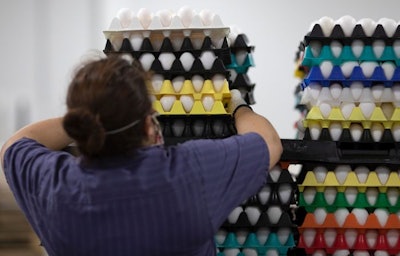
The past 12 months have been rather eventful for MPS Egg Farms.
The company, based in North Manchester, Indiana, has changed its name, acquired Texas-based egg producer Feather Crest Farms, kept its eyes on the industry transition to cage-free eggs and weathered the challenges brought on by the novel coronavirus (COVID-19) pandemic.
Sam Krouse, vice president of business development, not long ago returned to work for the family-owned egg business, after previously working for Conagra Brands Inc. and the Indiana State Department of Agriculture. During a recent interview with WATT Global Media, Krouse said the experience of being part of the sixth generation to hold a management position with the company has been challenging, yet rewarding.
His father, Bob Krouse, is the CEO of MPS Egg Farms, formerly known as Midwest Poultry Services, while his brother, Dan Krouse, is the vice president of operations.

Sam Krouse is vice president of business development of MPS Egg Farms. (Chris Bergin Photography)
Impact of COVID-19 on workers
Like most agrifood companies, MPS Egg Farms has had its operations affected by the COVID-19 pandemic.
“We have had some positive cases,” Krouse said. “We have not been totally free of any incidents, but I think we put in place a lot of social distancing measures right away.”
For instance, MPS Egg Farms split up its start times to minimize congregating in locker rooms. The company also staggered break times and added more break areas so workers can spread out during breaks.
“Our facilities are a little more automated and a little less person-dense than maybe some of the meat plants where people are shoulder to shoulder. So, we’re able in just our everyday operations to have more distance in people than maybe some other facilities do.”
Those strong biosecurity practices have paid off during the pandemic.
“Frankly, the fact that we’ve had some individuals who have come down with COVID, but it hasn’t proliferated on the farms, I think that speaks a lot for some of the things that we did put in place,” he said. “And, it gives us comfort as we continue to go and the economy opens back up. We’ll be able to keep operational and keep things going, and keep things safe.”

MPS Egg Farms has managed to prevent COVID-19 from proliferating in its farms. (Chris Bergin Photography)
Meeting egg demand
When the COVID-19 pandemic first struck, so did the increase in egg demand.
Krouse said MPS Egg Farms was able to meet the demand, but it had to purchase some eggs beyond those that were laid by the MPS flock.
“In the early days of the pandemic, we had about 100% demand lift for about a week as people were really stocking up and some of the panic buying was happening. Fortunately, we were also in the middle of our Easter inventory build at that point, so we had the eggs on hand in order to weather that initial slug of volume,” Krouse said. “But then as things continued, we were seeing about a 30% lift for the next two months or so, so in order to compensate for that, we did have to buy quite a few eggs off the market just to keep our customers whole and keep our commitments going.”
The practical disappearance of egg demand for the foodservice sector did not have much of an impact on MPS Egg Farms, because the company only has a “very, very small amount of foodservice business” through its Feather Crest acquisition, he said.
Carton shortages
When demand for eggs spiked, so did the demand for egg cartons. That added logistical challenges for egg companies, including MPS Egg Farms.
“Just like all of us, those guys have facilities and operations that are carefully tuned to produce efficiently the volumes the industry needs, so when there is a huge demand spike like we had, that can affect them pretty hard,” Krouse said.
While he said there were a few instances when MPS was “watching the clock, waiting for the cartons to come in so we could start packing eggs again,” he said it wasn’t much of an issue because of the dedication of the carton suppliers.
Cage-free egg production
Krouse said MPS has had some cage-free egg production since 2008. Presently, about 25% of MPS’ production is cage-free. All of Feather Crest’s operations use conventional hen housing.
He acknowledges the deadlines are fast approaching for various egg buyers to complete the transition to exclusively selling cage-free eggs, as well as state laws requiring cage-free egg production.
But Krouse said the company has no specific goals of transitioning its entire operations to cage free, unless all of its buyers want only cage-free eggs.
“Our goal is to serve our customers what they want, and I know their goal is to serve their customers what they want. As long as we can do that, we’re going to be happy. The 25% that we’ve reached, that’s just happened organically because that’s what our customers’ shoppers have demanded. As they continue to demand, whether that’s through the state laws, we’ll grow to meet that. If just general consumer demand increases, we’ll meet that. I think this is a time when it really pays to be flexible as a producer to just be able to be adaptable to whatever the market demands.”


















